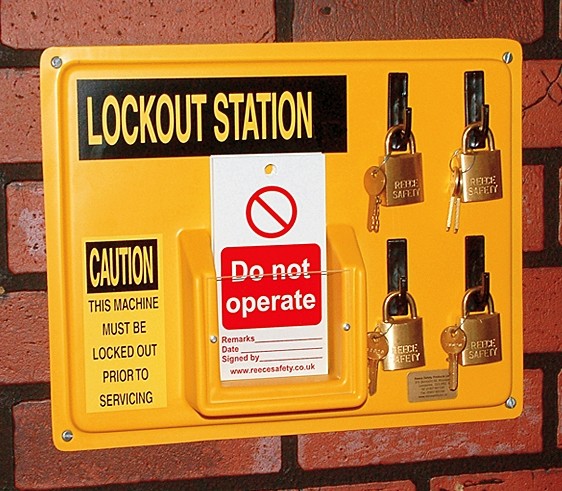Why are lockout stations important for trade businesses?

The lockout tagout tryout (LOTOTO) procedure has long been considered one of the safest ways to isolate equipment prior to maintenance work taking place. The procedure is comprised of nine stages that, when performed correctly, protect workers from potentially fatal injury. This can be caused by the accidental re-energisation of equipment that can occur if the LOTOTO procedure is performed incorrectly. Many businesses where machinery is used regularly, such as within the trade industry, have lockout stations within the workplace close by to staff, equipment, and machinery. Here, life-critical health and safety product provider, Reece Safety will discuss why lockout stations are useful and important to have within a health and safety strategy.
What are lockout stations and why are they needed?
Lockout stations are a fixed and secure place used for the storage of lockout equipment such as padlocks from Reece Safety, lockout hasps, lockout tags and valves. It is important to consider a range of padlocks to suit the requirements of a safe system of work and safe isolation to find the best for your business’ lockout station.
Lockout stations are made from durable plastic or metal. They are usually brightly coloured yellow or red to draw attention and be easily identified to show products missing. Lockout stations are usually wall-mounted, with their main purpose being to make access to isolation equipment as easy as possible for workers.
Lockout stations provide a secure place to store lockout equipment close by to machinery and equipment. If incorrectly performed, workers can suffer burns, electric shocks, cuts and crushing from machines and re-energised equipment. Having lockout equipment close to the machine means that the resources to complete the LOTOTO correctly, safely, and swiftly are in close proximity to workers. It has been proven that this approach to lockout tagout will result in a much safer working environment.
Why are they important for tradespeople and trade businesses?
Many trades businesses require lockout procedures to be performed on equipment as it is relied on every day and is essential to complete each job, with some examples being welders, mechanics, electrical workers, plant workers, and factory workers. Lockout stations are encouraged to be used in any place that has running machinery to increase to overall effectiveness of the LOTOTO programme and the safety of workers and visitors.
Lockouts are needed to be performed on many types of equipment from motors to electrical panels, and machines, which regularly need inspection and repair work. With such maintenance required daily within the trade industry, lockout is an everyday occurrence which needs to be made as safe and as efficient as possible. Therefore, lockout stations are essential for all tradespeople to increase the health and safety of workers.
The 9 steps of LOTOTO
Equipment must be safely locked out and tagged in the lockout procedure to ensure that equipment does not start up accidently. The lockout tagout tryout programme has recently been updated to nine stages. The stages of the procedure are as follows:
- Prepare
- Shut Down
- Equipment Isolation
- Begin Lockout
- Energy Isolation
- Verify Isolation
- Tryout
- Work
- Re-Energisation
It is important for every business that works with energised machinery to invest in a lockout station to securely store lockout equipment and act as a constant reminder to workers to complete the LOTOTO procedure when powering down.








